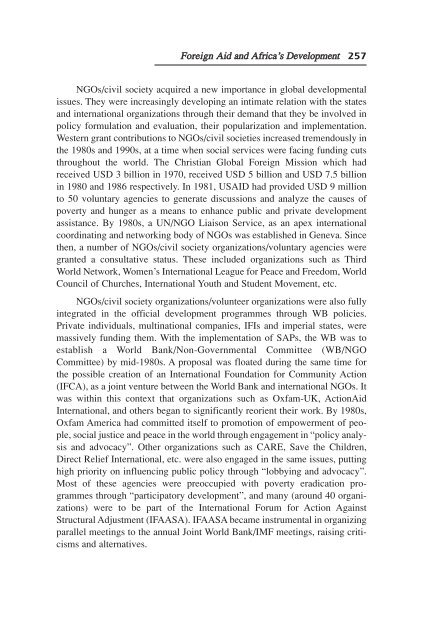EN - FR - Yükselen Afrika ve Türkiye / Rising Africa and Turkey 3
EN - FR - Yükselen Afrika ve Türkiye / Rising Africa and Turkey 3
EN - FR - Yükselen Afrika ve Türkiye / Rising Africa and Turkey 3
You also want an ePaper? Increase the reach of your titles
YUMPU automatically turns print PDFs into web optimized ePapers that Google loves.
Foreign Aid <strong>and</strong> <strong>Africa</strong>’s De<strong>ve</strong>lopment 257NGOs/civil society acquired a new importance in global de<strong>ve</strong>lopmentalissues. They were increasingly de<strong>ve</strong>loping an intimate relation with the states<strong>and</strong> international organizations through their dem<strong>and</strong> that they be invol<strong>ve</strong>d inpolicy formulation <strong>and</strong> evaluation, their popularization <strong>and</strong> implementation.Western grant contributions to NGOs/civil societies increased tremendously inthe 1980s <strong>and</strong> 1990s, at a time when social services were facing funding cutsthroughout the world. The Christian Global Foreign Mission which hadrecei<strong>ve</strong>d USD 3 billion in 1970, recei<strong>ve</strong>d USD 5 billion <strong>and</strong> USD 7.5 billionin 1980 <strong>and</strong> 1986 respecti<strong>ve</strong>ly. In 1981, USAID had provided USD 9 millionto 50 voluntary agencies to generate discussions <strong>and</strong> analyze the causes ofpo<strong>ve</strong>rty <strong>and</strong> hunger as a means to enhance public <strong>and</strong> private de<strong>ve</strong>lopmentassistance. By 1980s, a UN/NGO Liaison Service, as an apex internationalcoordinating <strong>and</strong> networking body of NGOs was established in Geneva. Sincethen, a number of NGOs/civil society organizations/voluntary agencies weregranted a consultati<strong>ve</strong> status. These included organizations such as ThirdWorld Network, Women’s International League for Peace <strong>and</strong> Freedom, WorldCouncil of Churches, International Youth <strong>and</strong> Student Mo<strong>ve</strong>ment, etc.NGOs/civil society organizations/volunteer organizations were also fullyintegrated in the official de<strong>ve</strong>lopment programmes through WB policies.Private individuals, multinational companies, IFIs <strong>and</strong> imperial states, weremassi<strong>ve</strong>ly funding them. With the implementation of SAPs, the WB was toestablish a World Bank/Non-Go<strong>ve</strong>rnmental Committee (WB/NGOCommittee) by mid-1980s. A proposal was floated during the same time forthe possible creation of an International Foundation for Community Action(IFCA), as a joint <strong>ve</strong>nture between the World Bank <strong>and</strong> international NGOs. Itwas within this context that organizations such as Oxfam-UK, ActionAidInternational, <strong>and</strong> others began to significantly reorient their work. By 1980s,Oxfam America had committed itself to promotion of empowerment of people,social justice <strong>and</strong> peace in the world through engagement in “policy analysis<strong>and</strong> advocacy”. Other organizations such as CARE, Sa<strong>ve</strong> the Children,Direct Relief International, etc. were also engaged in the same issues, puttinghigh priority on influencing public policy through “lobbying <strong>and</strong> advocacy”.Most of these agencies were preoccupied with po<strong>ve</strong>rty eradication programmesthrough “participatory de<strong>ve</strong>lopment”, <strong>and</strong> many (around 40 organizations)were to be part of the International Forum for Action AgainstStructural Adjustment (IFAASA). IFAASA became instrumental in organizingparallel meetings to the annual Joint World Bank/IMF meetings, raising criticisms<strong>and</strong> alternati<strong>ve</strong>s.





